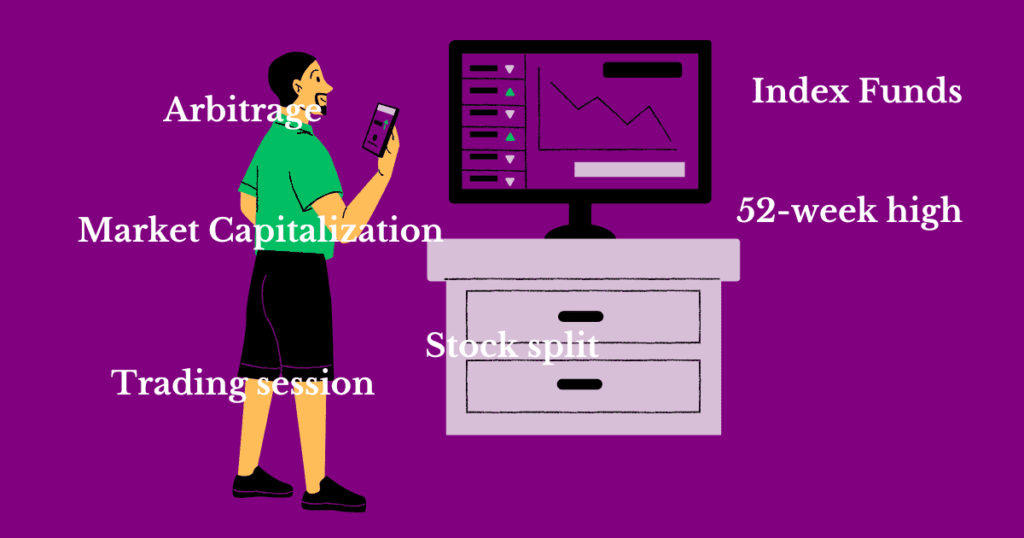Understanding the stock market is the challenging as well as entertaining task for the ones who love numbers and basic mathematics but stock market technical terms and jargon make it difficult for the beginners.
However, understanding this term is essential for any investor looking to make informed decisions in the stock market

Following is the list of Stock Market terms every one should know before entering the market
Annual Report:-
An annual report is a yearly document created by a company to share important information with its investors and the public. It includes details about the company’s financial health, performance, and future plans
Arbitrage:-
Arbitrage is a stock market term that involves buying an asset in one market and selling it in another where the selling price exceeds the initial purchase cost, leading to a profit.
Asset Class:-
An asset class refers to a group of financial instruments that made to grow money. Investors often allocate their portfolios across different asset classes to achieve diversification, spreading risk and potentially enhancing returns eg- Stocks, Gold, Bonds, Real Estate etc
Averaging Down:-
Averaging down is a stock market term which involves purchasing additional shares of a stock when its price decreases, thereby lowering the overall average cost of acquiring that specific stock.
Bull Market:-
Bull Market is a stock market condition in which the stock prices are on the rise, and investor confidence is high in the market
Bear Market:-
It is a stock market condition where investors talk about the stock market performing in a downward trend, or it is a certain period where the prices of multiple stocks are falling
Broker:-
A stock broker is a financial professional or firm in stock market that facilitates the buying and selling of stocks and other securities on behalf of investors and, in exchange, takes a certain amount of money called commission or fee. Stock brokers are registered with the regulatory board. In India stock brokers are registered with SEBI
Bonds:-
Bonds are debt securities issued by governments or corporations to raise money from investors. In return, investors receive periodic interest payments and the return of the principal amount at the bond’s maturity
To conveniently and swiftly invest in shares, explore 👉 Groww! 👈
Blue Chip Stocks:-
Blue chip Stocks are of well-established & are recognized for their stability, reliability, and strong standing in the stock markets. These companies are typically leaders in their industries, known for consistent performance, solid financials, and a history of paying dividends.
Capital Gain:-
Capital Gain refers to the profit earned from the sale of stock. It is calculated by taking the difference between the sale price of the stock and its original purchase price.
Example: If an investor buys a stock at Rs. 100 and sells it for Rs. 150, the capital gained is Rs. 50 per share.
Closing Price:-
The closing price is the last price at which stock, is traded at the conclusion of a trading session on a specific exchange.
Example: ABC stock traded at Rs. 240 at the end of the trading time then the closing price of ABC stock is Rs. 240
Demat Account:-
Demat or Demat Account is an electronic account which holds financial assets like shares, mutual funds, ETFs, bonds, sovereign gold bonds, etc. in digital form. Demat account is opened with brokers.
Dividend:-
Dividend is the portion of earning done by the company which is paid out to company’s shareholders. It is a type of reward company gives to its shareholders to show their trust on management and their decisions
Example: ABC has declared a dividend of Rs. 7 for its shareholders
Exchange:-
An exchange, or stock exchange, is a marketplace where investors and traders buy and sell stocks. You’ve probably heard of the most well-known exchanges in India Bombay Stock Exchange (BSE) National Stock Exchange (NSE).
Index Funds:-
Index funds, or index mutual funds are investment funds that aim to replicate the performance of a specific stock market index, like NIFTY & SENSEX which are major index in Indian Stock Market. When one invest in index mutual funds your money is used to invest in every company in that index. This results in a more diverse portfolio than if you were hand-selecting individual stocks.
IPO:-
IPO (Initial Public Offering) is the initial offering or sale of securities to the public. Here the owners or private investors sell their ownership in the company and offer it for sale to the public
Limit Order:-
A limit order is a trading instruction specifying the maximum price a buyer is willing to pay or the minimum price a seller is willing to accept for a stock
For a fast and convenient way to invest in shares, take a look at 👉 Groww! 👈
Market Capitalization:-
Market capitalization, often referred to as market cap. It is calculated by multiplying the current market price per share by the total number of outstanding shares
Example:- ABC company’s current market price is Rs. 100 and outstanding shares are 10 then
Market Cap=100 X 10=1000
Market Order:-
A market order is a request to buy or sell a financial instrument at the current market price. This type of order is executed as quickly as possible at best price possible. Several investors don’t go with this Order because the trade price in the market order remains volatile.
Moving Average:-
A moving average is the average price of stocks over a specific period of time. it’s calculated by averaging data from the previous time periods to help investors identify the current direction of price trends
Example: A 50-day moving average would be the average price of a stock over the last 50 days.
Outstanding Share:-
Outstanding shares refer to the total number of shares of a company’s stock that are currently held by investors. These shares are issued by the company and are available for trading on the open market
Portfolio:-
A stock portfolio is like your personal basket of investments, holding a mix of things like stocks, bonds, mutual funds, and other money-related stuff. It’s basically all the money stuff you own, even if it’s not kept in just one place.
Example: I have 10 shares of ABC Ltd, 15 shares of XYZ, & a mutual fund investment of Rs. 10000 so in total my stock portfolio has all these
Penny stock:-
A penny stock is a low-priced stock, typically traded at a very low market value these stocks are usually associated with smaller companies and may have a lower market capitalization. Investing in penny stocks can be riskier compared to larger, more established stocks,
Sector:-
A stock market sector refers to a group of companies that operate in the same industry or share similar business activities, products, and services. By grouping companies with shared characteristics, investors can gain valuable insights into how different sectors respond to various market forces.
Stop loss:-
Stop loss is an instruction set by an investor to execute a trade and cut losses when a specified price level is reached if market is moving against your favor
Example: If an investor bought a stock at the price of Rs 105 and places a stop loss order for a stock at Rs. 100 and the stock falls below that price, the stock is automatically sold to limit the investor’s losses.
Set Target:-
Set target is an instruction set by an investor to execute a trade and book profits when a specified price level is reached if market is moving in your favor
Example: If an investor bought a stock at the price of Rs 100 and places a set target at Rs. 110 and the stock hits that price, the stock is automatically sold to book the profit.
Stock split:-
Stock split is a corporate action in which company increases its existing outstanding shares. By splitting existing shares into multiple new shares, the stock becomes more affordable for the investors to invest in
Example: ABC share price is Rs. 100 and it announced a 1:5 stock split, which means that for every 1 share held, investors would receive 5 new shares so the price of new shares would be Rs. 20 each and the existing user will get 5 shares of Rs. 20
Trading session:-
A trading session refers to a specific period during which stock markets are open and active for buying and selling securities. This is the primary Indian stock market timing lasting from 9.15 a.m. to 3.30 p.m.
Yield:-
Yield refers to the income earned on an investment over a set period of time, expressed as a percentage of your original investment
52-week low:-
The 52-week low is the lowest trading price of a stock or security over the course of the last 52 weeks, providing a reference point for its recent historical performance.
52-week high:-
The 52-week high is the highest trading price of a stock or security over the past 52 weeks, serving as a reference point for its recent historical performance.
FAQs
In India which regulatory regulates stock brokers?
SEBI is the Indian regulatory which regulates stock brokers in Indian stock market
What is the full form of SEBI?
The SEBI full form in the stock market stands for Securities and Exchange Board of India (SEBI)
What is IPO full form?
The IPO full form in the stock market stands for Initial Public Offering (IPO)
What are major stock exchanges in India ?
In addition to the well-known National Stock Exchange (NSE) and Bombay Stock Exchange (BSE), India has four other enduring stock exchanges, bringing the total count to six in the country.
